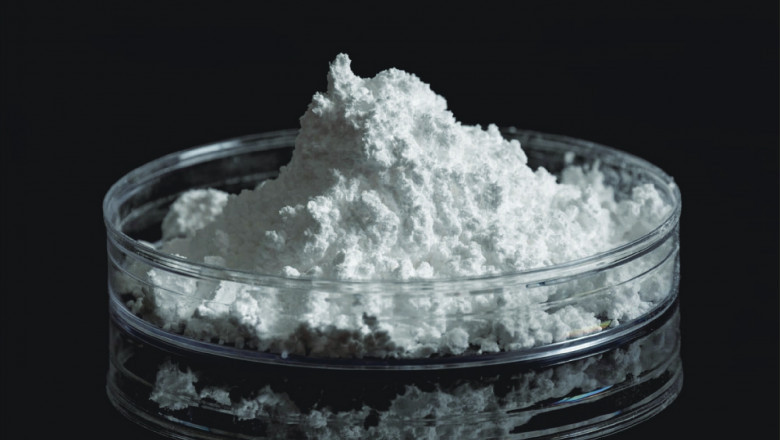views
Lithium carbonate is a crucial pharmaceutical compound and industrial chemical that has revolutionized the treatment of mental health conditions and plays a significant role in various industries. This inorganic compound, with the chemical formula Li2CO3, has been a cornerstone medication for bipolar disorder treatment since the mid-20th century and continues to be an essential component in modern medicine and technology.
Chemical Properties and Structure
Lithium carbonate exists as a white crystalline powder at room temperature and is classified as an inorganic salt. Its molecular structure consists of two lithium ions (Li+) combined with a carbonate ion (CO3²⁻). The compound has a molecular weight of 73.89 g/mol and demonstrates moderate solubility in water, which increases with temperature. This unique chemical structure contributes to its stability and effectiveness in various applications, particularly in medical treatments and industrial processes.
Medical Applications
The most well-known application of Lithium Carbonate is in psychiatry, where it serves as a mood stabilizer for treating bipolar disorder. It works by reducing abnormal activity in the brain and helps prevent manic episodes while also providing relief from depressive symptoms. The medication has proven particularly effective in reducing suicidal thoughts and behaviors among patients with mood disorders.
Healthcare professionals typically prescribe lithium carbonate as a long-term treatment option, carefully monitoring blood levels to maintain therapeutic effectiveness while avoiding toxicity. The drug's success in managing bipolar disorder has made it a first-line treatment option, earning its place on the World Health Organization's List of Essential Medicines.
Industrial Uses and Applications
Beyond its medical applications, lithium carbonate plays a vital role in various industrial processes. In the ceramics industry, it serves as a flux agent, helping to lower the melting point of glazes and improving their overall quality. The compound is also essential in the production of lithium-ion batteries, which power everything from smartphones to electric vehicles.
The glass and ceramics industries utilize lithium carbonate to enhance the strength and thermal shock resistance of their products. Additionally, the compound finds applications in the aluminum production process, where it helps reduce energy consumption and improves the metal's properties.
Safety and Environmental Considerations
While lithium carbonate offers numerous benefits, proper handling and disposal are crucial for environmental and human safety. The compound can be harmful if ingested in large quantities or handled improperly. Industrial facilities must implement proper safety protocols and waste management procedures to prevent environmental contamination.
Environmental impact assessments have shown that lithium mining and processing can affect local ecosystems. However, ongoing research and technological advancements are helping to develop more sustainable extraction and production methods, reducing the environmental footprint of lithium carbonate production.
Therapeutic Monitoring and Management
When used as a medication, lithium carbonate requires careful monitoring of blood levels to maintain therapeutic effectiveness while avoiding toxicity. Healthcare providers regularly conduct blood tests to ensure lithium levels remain within the therapeutic window, typically between 0.6 and 1.2 mmol/L. This monitoring is crucial as the gap between therapeutic and toxic levels is relatively narrow.
Patients taking lithium carbonate must maintain consistent fluid and salt intake, as changes in these factors can affect lithium levels in the body. Regular kidney and thyroid function tests are also necessary, as long-term use can impact these organs.
Future Prospects and Research
The importance of lithium carbonate continues to grow, particularly in the renewable energy sector. As the demand for lithium-ion batteries increases, researchers are exploring new methods to enhance production efficiency and reduce environmental impact. Additionally, ongoing studies are investigating potential new therapeutic applications for lithium carbonate in treating other neurological and psychiatric conditions.
Scientific advances in understanding the mechanism of action of lithium carbonate at the molecular level are opening new possibilities for drug development and targeted therapies. This research may lead to more effective treatments with fewer side effects.
Cost and Availability Considerations
The global demand for lithium carbonate has led to significant price fluctuations in recent years. The compound's importance in both pharmaceutical and industrial applications makes it a valuable commodity. Market analysts continue to monitor supply chains and production capabilities to ensure stable availability for both medical and industrial uses.
Quality Control and Manufacturing Standards
Manufacturing lithium carbonate requires strict adherence to quality control measures, especially for pharmaceutical-grade products. Manufacturers must comply with Good Manufacturing Practice (GMP) guidelines and undergo regular inspections to ensure product safety and efficacy. These standards help maintain consistent quality across different production batches and protect end-users.
Lithium carbonate's versatility and effectiveness in both medical and industrial applications make it an invaluable compound in modern society. From its critical role in treating mental health conditions.
Get More Insights On – Lithium Carbonate
Get this report in Japanese Language – 炭酸リチウム
Get this report in Korean Language - 탄산리튬
About Author
Vaagisha brings over three years of expertise as a content editor in the market research domain. Originally a creative writer, she discovered her passion for editing, combining her flair for writing with a meticulous eye for detail. Her ability to craft and refine compelling content makes her an invaluable asset in delivering polished and engaging write-ups.
(LinkedIn: https://www.linkedin.com/in/vaagisha-singh-8080b91)






















Comments
0 comment